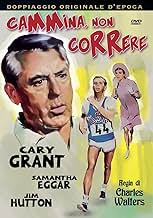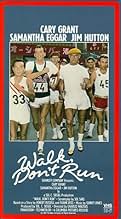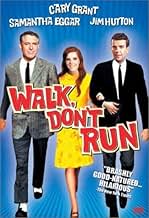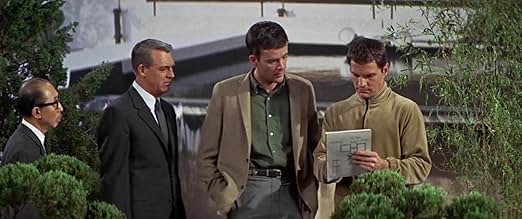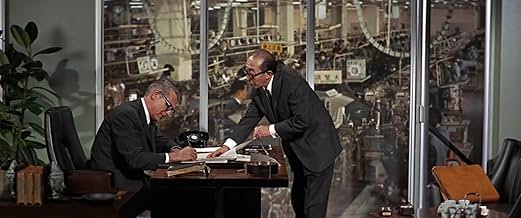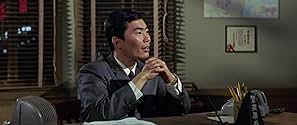IMDb RATING
6.6/10
4.9K
YOUR RATING
During the housing shortage of the Summer Olympic Games in 1964, two men and a woman share a small apartment in Tokyo, and the older man soon starts playing Cupid to the younger pair.During the housing shortage of the Summer Olympic Games in 1964, two men and a woman share a small apartment in Tokyo, and the older man soon starts playing Cupid to the younger pair.During the housing shortage of the Summer Olympic Games in 1964, two men and a woman share a small apartment in Tokyo, and the older man soon starts playing Cupid to the younger pair.
Holger Abro
- Swedish Athlete
- (uncredited)
Isabel Boniface
- Mexican Athlete
- (uncredited)
Vickey Cason
- Contortionist
- (uncredited)
David Draper
- Swedish Athlete
- (uncredited)
Terry Farnsworth
- Olympic walker
- (uncredited)
Sonja Haney
- Swedish Athlete
- (uncredited)
Sonya Harrison
- American Athlete
- (uncredited)
Featured reviews
It was on TV during lockdown, nothing else on, and I was busy pottering around but got quickly drawn in.
There are some absolutely masterful moments, tiny details in the acting and scripting that are reminiscent of a bygone age of film in which love honesty kindness and trust were still understood.
The acting is superb throughout and they all have immense timing and patience to make it even funnier.
An unexpected joy.
I saw this again on TV the other night, and the sad fact is that it's a very dated, formula-driven 1960s comedy that would deservedly be forgotten except for three things:
1) If you're interested in the Olympics, it offers one of the few looks at Tokyo during the 1964 games. I'm not sure if any other films use the Tokyo games as a setting. Also, it offers a glimpse at 1960s Tokyo, which apparently no longer exists.
2) He was old and graying and his material was awful, but in many ways, this film displays the magic of the great Cary Grant. He rose above lame material one more time, and without him, this would have been unwatchable.
3) I will never forget the closing line from the original TV ads for this film: "Run, don't walk to see 'Walk, Don't Run.' " They don't make them like that anymore.
1) If you're interested in the Olympics, it offers one of the few looks at Tokyo during the 1964 games. I'm not sure if any other films use the Tokyo games as a setting. Also, it offers a glimpse at 1960s Tokyo, which apparently no longer exists.
2) He was old and graying and his material was awful, but in many ways, this film displays the magic of the great Cary Grant. He rose above lame material one more time, and without him, this would have been unwatchable.
3) I will never forget the closing line from the original TV ads for this film: "Run, don't walk to see 'Walk, Don't Run.' " They don't make them like that anymore.
Walk Don't Run (1966)
In my book, Cary Grant can do no wrong, and he absolutely makes this movie. It's a bit of a 1960s farce, and is maybe exactly what everyone was reacting against with the shift in movies around this time to greater realism and pertinence. This has neither!
But that's okay, it has beauty (the sets, architecture, and widescreen filming are all really fabulous) and innocence, which is weird to remember. Even sweet romances from our time, like Sleepless in Seattle, don't have the same pure innocence of this, which I think is genuine in its own way. The scene is mid-60s Tokyo, which is hard to beat for interest (and great cars). The plot? Oh, I'm not sure it actually has one that matters, except boy meets girl. It's mostly like a super high class situation comedy, and the comedy is more important than the situation.
And more important than both is Cary Grant, who is in great form. Yes, Jim Hutton is there (and he's fine but forgettable) as well as the female lead, Samantha Eggar (who is not as fine, but is fine anyway, and also forgettable). But then there is Cary Grant. There are even some odd gay gaze moments, where Grant, and the camera, check out the legs or body of a man (Grant, though married, was also gay, it appears). If you catch it it's almost shocking, but perhaps the audience was so innocent, as well, it was thought of as simply funny.
So: drop Cary Grant beautifully in Tokyo and create a nonsensical series of little gags, and you have it. And it's Grant's last film.
In my book, Cary Grant can do no wrong, and he absolutely makes this movie. It's a bit of a 1960s farce, and is maybe exactly what everyone was reacting against with the shift in movies around this time to greater realism and pertinence. This has neither!
But that's okay, it has beauty (the sets, architecture, and widescreen filming are all really fabulous) and innocence, which is weird to remember. Even sweet romances from our time, like Sleepless in Seattle, don't have the same pure innocence of this, which I think is genuine in its own way. The scene is mid-60s Tokyo, which is hard to beat for interest (and great cars). The plot? Oh, I'm not sure it actually has one that matters, except boy meets girl. It's mostly like a super high class situation comedy, and the comedy is more important than the situation.
And more important than both is Cary Grant, who is in great form. Yes, Jim Hutton is there (and he's fine but forgettable) as well as the female lead, Samantha Eggar (who is not as fine, but is fine anyway, and also forgettable). But then there is Cary Grant. There are even some odd gay gaze moments, where Grant, and the camera, check out the legs or body of a man (Grant, though married, was also gay, it appears). If you catch it it's almost shocking, but perhaps the audience was so innocent, as well, it was thought of as simply funny.
So: drop Cary Grant beautifully in Tokyo and create a nonsensical series of little gags, and you have it. And it's Grant's last film.
This film was probably launched as a "Cary Grant" vehicle, a remake of "The More the Merrier", but I suggest it is a major comedy for several other reasons. As William Rutland, peer and genial businessman and busybody, Grant is mature and good; but involving him in the housing shortage in Tokyo during the 1964 Olympics was a stroke of near-genius. Adding in the old storyline about a girl planning to marry for money and introducing the right man for her instead, in the persons of Samantha Egggar and Jim Hutton, was better, with Grant acting as matchmaker. But making Hutton a member of the US Olympic team and keeping his event a secret, adding in a comedic Russian spy, the smallness of their shared apartment which Grant sublets to Hutton after wangling his own way in, plus visiting a Japanese household of friend Miiko Taka with Eggar and fiancée John Standing, he of the "tall forehead" and boring personality, was I claim pure gold comedically speaking. Charles Walters directed this satirical comedy in breezy style, with story by Robert Russell and Frank Ross from Sol Saks' and Grason Kanin's inspired story. The cast included besides the principals George Takei as a Tokyo police officer, Ben Astar as Dimitri the bumbling Russian spy, skilled actor Teru Shimada as Taka's father, Lois Kiuchi as her mother, Ted Hartley as Yuri, Hutton's Russian fellow athlete-friend, and hundreds of others in bit parts and small roles. The very genial music for the film by Quincy Jones was low-key and delightful; Henry Mancini supplied songs also; the cinematography by Harry Stradling Sr. was lovely from start to finish; and the production designs by Joseph C. Wright were varied and serviceable through. Outstanding scenes in the narrative include I suggest the way in which Sir William's trousers keep disappearing, the attempt by Grant in underwear to enter the Olympic walking event to obtain a signature on a document from Hutton, the party where Grant suggest to a lady Russian shot putter that she put her derrière somewhere else than in his dinner, the trip to see Eggar's friends (the Kurawa family) and the police station scene, among others. This is a sometimes slick and always amusing and I find frequently very-involving story filled with characters that seem unusually real. It may have begun as a Cary Grant vehicle; but I find Hutton is brilliant, and it became despite a bit of over- lengthy presentation a classic as a romance, a comedy concerning overcrowding and a presentation of very memorable characters whose general theme is how one need to deal with life by means of honesty rather than by taking the seemingly easiest path. A favorite of many, many filmgoers, myself included.
I am a huge Cary Grant fan and in this, his final film, he is charming as usual. Jim Hutton and Samantha Eggar are very good as the victims of his matchmaking. Its predictable but who cares? Its a feel good movie and I give it ***** big stars out of 5.
Did you know
- TriviaCary Grant (Sir William Rutland) retired from acting after this movie because, at sixty-one, he had become too old to play the romantic lead. Grant, furthermore, did not think his fans would want to see him playing supporting roles.
- GoofsAt the race, Julius says the fastest time for the 50 km race-walk is "four hours and fifty-three minutes." At the time of the 1964 Olympics, the men's 50 km race-walk world record was actually 4:00:50. (At the time of the film's release, the record was 3:55:36.)
- Quotes
Christine Easton: After 7:45, you can have the bathroom all day if you'd like.
Sir William Rutland: I wouldn't know what to do in the bathroom all day!
- ConnectionsFeatured in American Masters: Cary Grant: A Class Apart (2004)
- SoundtracksAn Affair to Remember (Our Love Affair)
(uncredited)
Music by Harry Warren
Lyrics by Harold Adamson and Leo McCarey
Sung by Cary Grant
- How long is Walk Don't Run?Powered by Alexa
Details
Box office
- Gross US & Canada
- $9,810,000
- Runtime
- 1h 54m(114 min)
- Sound mix
- Aspect ratio
- 2.35 : 1
Contribute to this page
Suggest an edit or add missing content



